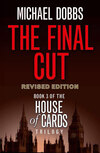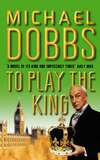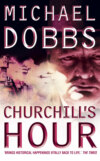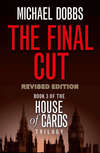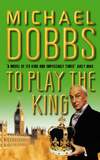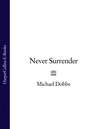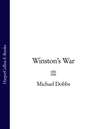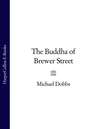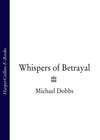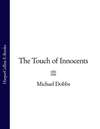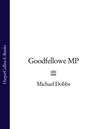Kitabı oku: «The Final Cut», sayfa 5
‘I understand.’ He had been hoping for some acknowledgement of his own irreplaceable worth.
‘And because now I own you. Today, tomorrow, and for as long as I wish. You will jump whenever I flick my fingers, whether it be at the throats of our enemies or into your own grave. Without question. Total loyalty.’
‘Of course, Francis. You had that anyway.’ He turned to leave.
‘One last thing, Geoffrey.’
‘Yes?’
‘Give me back my fountain pen.’
CHAPTER SEVEN
Some people prefer to pour oil on troubled waters. I prefer to throw a match.
The sun blazed fiercely outside the window, and the coffee on the table in small cups was dark and thick; in all other respects the office with its stylishly simplistic furniture and modern art trimmings might have been found on the Skeppsbron overlooking the harbour in Stockholm. Yet most of the books along the light oak bookshelves were in Turkish, and the two men in the room were of dark complexion, as were the faces in the family photographs standing behind the desk.
‘Now, what brought you in such a hurry to Nicosia?’
‘Only a fool tarries to deliver good tidings.’
There was an air of formality between them, two Presidents, one Yakar, chief of the Turkish National Oil Company, and the other, Nures, political head of the Republic of Turkish Cyprus. It was not simply that the oil man was a homosexual of contrived manner and the politician a man of robust frame, language and humour; there was often a distance between metropolitan and islander which reflected more than their separation by fifty miles of sea. It had been a century since the Ottomans had ruled Cyprus and differences of culture and perspective had grown. Mainlanders patronized and shepherded the islanders – had they not delivered their cousins from the clutches of Greek extremists by invading and then annexing one third of the island in 1974? At one moment during those confused days, the Turkish Cypriots had found themselves on the point of a Greek bayonet, the next they had been in charge of their own state. Except the Government in Ankara kept treating it as though it were their state.
Time to get rid of them, Mehmet Nures told himself yet again. For a thousand years mainland Turks and Greeks and the imperialist British had interfered and undermined, using the island as a well at which to quench the thirst of their ambitions. They’d sucked it dry, and turned an island of old-fashioned kindnesses and a million butterflies into a political desert. Perhaps they couldn’t step through the looking glass, back to the ways of old, with bubble-domed churches standing alongside pen-nib mosques, but it was time for change. Time for Cypriots to sort out their own destiny, time for peace. The question was – whose peace?
‘I have the honour to present to you a draft of the formal report that Seismic International will publish in a few days following their recent survey of the offshore waters.’ The oil man removed a folder from a slim leather case and deposited it in front of Nures, who proceeded to rustle through its pages. The file contained many coloured maps and squiggles of seismic cross-sections with much technical language that was quite beyond him.
‘Don’t treat me like a tortoise. What the hell does all this mean?’
Yakar tugged at his silk shirt cuffs. ‘Very little. As expected, the seismic survey has revealed that beneath the waters of Cyprus there is much rock, and beneath the rock there is…much more rock. Not the stuff, I fear, of excited headlines.’
‘I sit stunned with indifference.’
Yakar was playing with him, a reserved smile loitering around his moist lips. ‘But, Mr President, I have a second report, one which neither Seismic International nor anyone else has – except for me.
And now you.’ He handed across a much slimmer file, bound in red and bearing the TNOC crest.
‘Not the Greeks, you mean?’
‘May my entrails be stretched across the Bosphorus first.’
‘And this says…?’
‘That there is a geological fault off the coast of Cyprus which has tilted the subsurface geology of the sea bed to the north and west of the island. That the structure in that area does indeed contain oil-bearing rock. And that the fault has tipped all the oil into a great big puddle about – there.’ He stretched and prodded a bejewelled finger at the map Nures was examining.
‘Shit.’
‘Precisely.’
The tip of Yakar’s manicured nail was pointing directly at what had become known as ‘Watling Water’ – the sea area contested between Greek and Turkish Cypriot negotiators and currently the subject of arbitration by the British professor’s panel.
Nures felt a current of apprehension worm through his gut. It had taken him years to balance the scales of peace, feather by feather, he didn’t know if he wanted tons of rock thrown at it right now, oil or no oil. The peace deal was important to him; by giving up so little to the Greek side he could gain so much for his people – peace, international acceptance, true independence, prosperity – and possibly a Nobel Peace Prize for himself. All in exchange for a little land and a stretch of water that was worthless. Or so he had thought.
A thick hand rasped across his dark chin. ‘How much oil?’ he asked, as if every word had cost him a tooth.
‘Perhaps a billion barrels.’
‘I see,’ he said, but clearly didn’t. ‘What does that mean?’
‘Well, the international spot price for oil is around twenty dollars a barrel at the moment. Cost of extraction about five. In round terms – approximately fifteen billion dollars.’
The oil man was whimpering on about Turkish brotherhood and TNOC getting preferential access, teasing out the deal he wished to cement. Nures closed his hooded eyes as though to shut himself away from such squalor, but in truth to contemplate temptation. He had an opportunity – had created the opportunity – to turn a tide of history that had forced poison between the lips of Cypriots and had condemned his own son to be raised in a land of fear. For his grandson it could be different.
Would the world forgive him for endangering the peace process? Would his people forgive him for missing out on fifteen billion dollars’ worth of oil? But could he forgive himself if he didn’t try to grab both?
No contest.
‘President Yakar, I think we want those rocks.’
‘President Nures, I rather think we do.’
Yaman Hakim felt conspicuous. He had put on his best suit but it was modestly cut and he looked clumsy and other-worldly amidst the style and selfassertiveness on the rue St Honoré. Still, he reminded himself, he was not here for a fashion show.
He’d first thought of making the exchange in Istanbul with its cloudburst of humanity beneath which one solitary soul might disappear, but even amongst the labyrinth of souks and smoky bazaars the authorities had their men, the informers, and there was always the danger of his bumping elbows with someone he knew. He didn’t trust his luck in such matters; he’d once gone off to Antalya on the excuse of an energy symposium in order to spend two nights with Sherif, a nubile young girl from Personnel who was into older men, only to discover that a neighbour had booked into the next room. Praises to God, the man had been engaged on a similar mission of deceit, allowing them to share the solidarity of sinners. Yet he felt the presence of prying eyes everywhere in his homeland, and this was worth so much more than a quick scramble between the sheets.
He had chosen Paris because he had once visited it as a student many years before, because there was no chance of his being recognized – and because the French understood what was required. The English were too stuffy and of constricted sphincter, while the Americans were all cowboys. If he were to survive, Hakim needed discretion, a partner who could be trusted to keep his mouth shut and not be found after two drinks and an encouraging smile bragging about it in the bar of the Hilton. In matters of corporate espionage, tax evasion and fraud the French had all the necessary finesse, they also had bank accounts untraceable by the Turkish authorities; pity about their limp coffee.
Anxiety had made him early and he sat in the sidewalk café swirling the dregs in his cup, waiting. His mind danced with thoughts – of drowsy islands set in mystical seas that shimmered as though studded with a treasury of diamonds; of bougainvillea-clad villas overlooking the sacred Bosphorus and tinkling to the sound of female laughter; of oil wells trembling in the Mediterranean breeze beneath their plumes of black gold – and of the fetid rat-filled walls of Istanbul’s notorious Yedi Giile prison, echoing with the cries of those who had come too late to repentance. It was not too late for him, not yet, he could still get out, go home, be back in the office tomorrow. Back to being Hakim the Forgotten. The man whose skill and experience had single-handedly uncovered one of the great natural treasure troves of his lifetime – without whom none of this great adventure in exploration would have been possible! But even as he had handed them his report and analysis, his chest heaving with pride, they had told him it was all in a day’s work, what TNOC paid him for, he shouldn’t expect any recognition or thanks. And he had received none.
An executive Citroën with immaculate black paintwork drew up on the roadway beside him and a window of darkened glass wound down.
‘Mr Hakim, over here. Quickly, please!’
Already the Volkswagen behind was sounding its horn impatiently. They had told him about the café, said nothing about a car. Disconcerted, untrusting, but seemingly with little option, the Turk scurried across the pavement. The rear door opened and he settled into the deep leather seat. A hand extended, cuffed in a timepiece of Swiss gold.
‘Delighted to meet you at last, Mr Hakim.’
He had insisted on meeting the top man, face to face, not being fobbed off with aides and underlings. He needed decisions, he wanted to deal with the man who made them.
‘Forgive the caution. Couldn’t be sure you didn’t have – how can I put it? – somebody else watching us at the café. A news photographer. A competitor, perhaps? I thought a little privacy might assist our discussions.’
Hakim grunted. The man reeked of authority, money; Hakim was well out of his league.
‘We were very interested in the material you sent us, Mr Hakim…’ – carefully selected pages from the report, crumbs to whet the appetite but not enough to chew on – ‘…interested enough to check you out. You’re genuine. But is your report?’
In response, Hakim took a single folded sheet of paper from his suit pocket and, with only the slightest hesitation for a final thought, passed it across. It was the report’s summary page, giving the estimates of the potential beneath the sea bed.
‘Fascinating. And I assume there is a price for this material.’
‘A heavy price,’ Hakim growled, snatching back the single sheet. ‘But a very fair price.’
‘How much?’
‘For the entire report?’ He chewed his thumb nail. ‘A million dollars.’
The other man didn’t flinch. His stare was direct, examining Hakim as if some clue to their business might be found in his leathered face; defiantly the Turk stared back.
‘This matter is very simple, Mr Hakim. Your information is of no value to anyone unless it is accurate, and of no value to my company unless we get the licence to drill.’
‘When the time comes you will buy the licence. With this report you will know how much to pay – and who to pay.’
‘That time is some way off.’
‘Sadly for you, I am not a patient man.’
‘Then let me get to the point. My proposal – which is also my final proposal – is this.’ An envelope had appeared in his hands. ‘Here is fifty thousand dollars, for sight of the report. If after studying it we believe its contents to be genuine, there will be another two hundred thousand dollars.’ He held up a hand to stay the objection beginning to bubble within the Turk. ‘And if my company succeeds in obtaining the licence and striking oil, there will be a payment to you of not one, but two million dollars. Worth that, if what you say is true.’
It was the Turk’s turn to consider, agitatedly squeezing his salt-streaked moustache as though wishing to pluck it from his lip. ‘But how can I trust you?’
‘Mr Hakim, how can I trust you? How am I to know you’re not hawking this same document around every one of my competitors? There has to be a measure of mutual trust. And look at it this way, what would be the point of my trying to cheat you of millions when there are potentially billions at stake?’
The Turk was breathing heavily, trying to encourage the supply of oxygen to his thought processes.
‘If your document is genuine, I shall be giving you a quarter of a million dollars with only your word that it’s the sole copy in circulation. A costly mistake for me if your word is false.’ The Frenchman paused. ‘But it would be a still more costly mistake for you.’
‘What?’ Hakim mocked. ‘You are threatening to break my legs?’
‘Not at all, my friend. I would simply let the Turkish authorities know of your activities. I imagine your legs would be the least of your problems.’
The Frenchman smiled, raised the envelope with its fifty thousand dollars and gently proffered it.
Hakim stared, debated, twisted and tore at himself, but the exercise was pointless. It was too late now, neither conscience nor caution could argue with fifty thousand dollars and more, much more, to come. From within his briefcase of imitation crocodile he extracted his report and handed it across.
CHAPTER EIGHT
What is the point of conquering mountains? It’s bloody cold, the food is appalling and who wants to do everything roped helplessly to some stumbling idiot?
No, not mountains. Better to conquer men.
A glorious spring dawn brimming with rose-tinged enthusiasm had advanced across London, delighting most early risers. Mortima Urquhart could not know her husband shared none of the collective spirit.
‘Good morning, Francis. The weather gods seem to be smiling in celebration. Happy birthday.’
He didn’t move from his position staring out from the bedroom window and at first offered only a soft ‘Oh, dear’ and a slight flaring of the nostrils in response. He lingered at the window, captured by something outside before shaking his head to clear whatever pest was scratching at his humour. ‘What have you got for me this year? Another Victorian bottle for the cabinet? What is it – eighteen years of bloody bottles? You know I can’t stand the things.’ But his tone was self-critical, more irony than ire.
‘Francis, you know you have no interests outside politics and I’m certainly not going to give you a bound copy of Hansard. Your little collection has at least given you something for the hacks to put in their profiles, and this particular piece is rather lovely. A delicate emerald green medicine bottle which is supposed to have belonged to the Queen herself.’ She puckered her lips, encouraging him along. ‘Anyway, I like it.’
Then, Mortima, if you like, so shall I.’
‘Don’t be such a curmudgeon. I’ve something else for you, too.’
At last he turned from the window and sat opposite her as she held forth a small package with obligatory ribbon and bow. Unwrapped, it teased from him the first sign of pleasure. ‘Burke’s Reflections on the Revolution in France. And an early edition.’ He fingered the small leather-bound volume with reverence.
‘A first edition,’ she corrected. ‘The pioneer volume for the Urquhart Library, I thought.’
He took her hands. ‘That is so typically thoughtful. And how appropriate that our Library should start with one of the finest anti-French tirades ever written. You know, it might inspire me. But…I have to admit, Mortima, that this talk of birthdays and libraries smacks all too much of retirement. I’m not yet ready, you know.’
‘The young pretenders may seem fleeter of foot, Francis, but what’s their advantage if you are the only one who knows the route?’
‘My life would be so empty and graceless without you,’ he smiled, and meant it. ‘Well, time to give the ashes a rake and discover whether the embers still glow.’ He kissed her and rose, drawn again to the view from the window.
‘What is out there?’ she demanded.
‘Nothing. As yet. But soon there may be. You know the Thatcher Society wants to erect a statue to the Baroness on that piece of lawn right out there.’ He prodded a finger in the direction of the carefully manicured grass that lay beyond the wall of the Downing Street garden, opposite St James’s Park. ‘You know, this is a view that hasn’t much changed in two hundred and fifty years; there’s a print hanging in the Cabinet Room and it’s all there, same bricks, same doors, even the stones on the patio are original. Now they want to put up a bloody statue.’
He shook his head in disbelief. ‘And the erection fund is almost fully subscribed.’ He turned sharply, his face twisted by frustration. ‘Mortima, if the first thing I’m going to see every morning of my life when I draw my bedroom curtains is that bloody woman, I think I shall expire.’
‘Then stop it, Francis.’
‘But how?’
‘She doesn’t merit a statue. Thrown out of office, betrayed by her own Cabinet. Is the statue going to show all those knives in her back?’
‘Yet almost all of them are hacked from office, my love. By their colleagues or the electorate. Like Caesar, taken from behind by events they hadn’t foreseen. Ambition makes leaders blind and lesser men bloody; none of them knew when the time had come to go.’
‘There’s only one Prime Minister who should have a statue there, and that’s you!’
He chuckled at her commitment. ‘Perhaps you’re right – but flesh and blood turn to stone all too soon. Don’t let’s rush it.’
He turned himself to stone two hours later, as fixedly as if he had spent the night wrapped in the arms of the Medusa. It was his press secretary’s habit to arrange on a regular basis a meeting with representatives of charities – ordinary members, not experienced leaders – inviting them to the doorstep of Number Ten but not beyond, a visit too brief to allow for any substantial lobbying but long enough to show to the cameras that the Prime Minister cared – the ‘Click Trick’, as the press secretary, a hockey player and enthusiast named Drabble, termed it. Having been at his desk since six collating the morning’s press, extracting from it selected articles he thought worthy of note and preparing a written summary, he met Urquhart in the entrance hall shortly before nine thirty.
‘What is it today, Drabble?’ Urquhart enquired, striding briskly down the red-carpeted corridor from the Cabinet Room.
‘A birthday surprise, Prime Minister. This week it’s pensioners, they’re going to make a presentation.’
Somewhere inside, Urquhart felt part of his breakfast liquefying. ‘Was I told of this?’
‘You had a note in your box last weekend, Prime Minister.’
‘Sadly, kept from me by more pressing letters of state,’ Urquhart equivocated. Damn it, Drabble’s notes were so tedious, and if a Prime Minister couldn’t rely on professionals to sort out the details…
The great door swung open and Urquhart stepped into the light, blinked, smiled and raised a hand to greet the onlookers as though the street were filled with a cheering crowd rather than a minor pack of world-weary journalists huddled across the street. A group of fifteen pensioners drawn from different parts of the country were gathered round him, arranged by Drabble, who was giving an advanced simulation of a mother hen. The mechanics were always the same: Urquhart asked their names, listened with serious-smiling face, nodded sympathetically before passing on to the next. Soon they would be whisked off by one of Drabble’s staff and a junior Minister from an appropriate department to be plied with instant coffee and understanding in a suitably impressive Whitehall setting. A week later they would receive a photograph of themselves shaking hands with the Prime Minister and a typed note bearing what appeared to be his signature thanking them for taking the trouble to visit. Their local newspapers would be sent copies. Occasionally, the discussions raised points or individual cases which were of interest to the system; almost invariably the majority of those involved went back to their pubs and clubs to spread stories of goodwill. A minor skirmish in the great war to win the hearts and votes of the people, but a useful one. Usually.
On this occasion, Urquhart had all but completed the ritual of greeting, moving on to the last member of the group. A large package almost five foot in height was leaning against the railings behind him and, as Urquhart swung towards him, so the pensioner shuffled the package to the fore. It turned out to be a huge envelope, addressed simply: TO THE PRIME MINISTER.
‘Many happy returns, Mr Urquhart,’ the pensioner warbled.
Urquhart turned round to look for Drabble, but the press officer was across the street priming the cameramen. Urquhart was on his own.
‘Aren’t you going to open it then?’ another pensioner enquired.
To Urquhart’s mind the flap came away all too easily, the card slipped out in front of him.
WE ARE FOR YOU, FU was emblazoned in large red letters across the top. Across the bottom: 65 TODAY!
The group of pensioners applauded, while one who was no taller than the card itself opened it to reveal the message inside.
WELCOME TO THE PENSIONERS’ CLUB, it stated in gaudy handscript. OAP POWER! The whole thing was decorated with crossed walking sticks.
Urquhart’s eyes glazed like marble. Rarely had the photographers seen the Prime Minister’s smile so wide, yet so unmoving, as if a chisel had been taken to hack the feature across his face. The expression lingered as he was drawn across the street, more to lay his hands upon the wretched Drabble than to go through the ritual of bantering with the press.
A chorus of ‘Happy Birthday’ mingled with shouts of ‘Any retirement announcement yet, Francis?’ and ‘Will you be drawing your pension?’ He nodded and shook his head in turn. The mood was jovial and Drabble enthusiastic; the fool had no idea what he’d done.
‘Are you too old for such a demanding job at sixty-five?’ one pinched-faced woman enquired, thrusting a tape recorder at him.
‘Churchill didn’t seem to think so. He was sixty-five when he started.’
‘The American President is only forty-three,’ another voice emerged from the scrum.
‘China’s is over ninety.’
‘So, no discussions about retirement yet?’
‘Not this week, my diary is simply too full.’
Their slings and arrows were resisted with apparent good humour; he even managed to produce a chuckle to indicate that he remained unpricked. Politics is perhaps the unkindest, least charitable form of ritualized abuse allowed within the law; the trick is to pretend it doesn’t hurt.
‘So, what do you think of today’s poll?’ It was Dicky Withers of the Daily Telegraph, an experienced hand known for concealing an acute instinct behind a deceptively friendly pint of draught Guinness.
‘The poll.’
‘Yes, the one we carried today.’
Drabble began an unscheduled jig, bouncing from foot to foot as though testing hot coals. He hadn’t included the poll in his digest, or the intemperate editorial in the Mirror entitled IT’S TIME TO GO. Christ, it was the man’s birthday, one day of the year to celebrate, to relax a little. And it wasn’t that Drabble was an inveterate yes-man, simply that he found it easier to accept the arguments in favour of circumspection, – all too frequently messengers who hurried to bring bad news from the battlefield were accused of desertion and shot.
‘Forty-three per cent of your own party supporters think you should retire before the next election,’ Withers elaborated.
‘Which means a substantial majority insisting that I stay on.’
‘And the most popular man to succeed you is Tom Makepeace. Would you like him to, when the time comes?’
‘My dear Dicky, when that time comes I’m sure that Tom will fight it out with many other hopefuls, including the bus driver.’
Makepeace = bus driver, Withers scribbled, noting the uncomplimentary equivalence. ‘So you intend to go on, and on, and on?’
‘You might say that,’ Urquhart began, ‘but I wish you wouldn’t. I’m enjoying a good innings and, though I’m not greedy for power, so long as I have my wits and my teeth and can be of service…’
‘What do you intend to do when eventually you retire, Mr Urquhart?’ Pinch Face was thrusting at him again.
‘Do?’ The creases of forced bonhomie turned to a rivulet of uncertainty. ‘Do? Do? Why, be anguished and morose like the rest of them, I suppose. Now, you’ll excuse me, ladies and gentlemen. I have a Cabinet meeting to attend.’
He turned and embarked upon what he hoped was a dignified retreat back across the street – like a lion regaining his den, Drabble decided, tail thrashing ominously. He declined to follow.
Urquhart brushed into his wife as she was emerging from the lift to their private apartment. ‘Everything went well?’ she enquired before she had noticed his eyes.
‘They say it’s time for a change, Mortima,’ he spat, grinding his teeth. ‘So I’m going to give ’em change. Starting with that bloody fool of a press secretary.’
‘Astonishing,’ Urquhart thought to himself as the Cabinet filed in around the great table, ‘how politicians come to resemble their constituencies.’
Annita Burke, for instance, an unplanned Jewish suburb full of entangling one-way systems. Richard Grieve, a seedy run-down sea front (which he had once plastered with election posters stating GRIEVE FOR RUSHPOOL and had somehow managed to live it down). Arthur Bollingbroke, a no-frills Northern workingmen’s club with a strong tang of Federation bitter. Colin Catchpole, the member for the City of Westminster, a ruddy face with the red-brick architectural style of the Cathedral, while other parts of his anatomy were rumoured to linger in the backstreets of Soho. Geoffrey Booza-Pitt – yes, Geoffrey, an invented showman for the invented showtown of New Spalden. Middle class and entirely manufactured, lacking in roots or history – at least any history Geoffrey wished to acknowledge. He had been born plain Master Pitt to an accountant father with a drinking problem; the schoolboy Geoff had invented an extended name and some mythical South African origin to explain away untidy gossip about his father which had been overheard by friends across a local coffee shop. And it had stuck, like so many other imaginative fictions about his origins and achievements. You could fool some of the people all of the time, and Geoffrey reckoned that was enough.
Then there was Tom Makepeace. With the flat humour of the East Anglian fens, the stubbornness of its clays and the moralizing tendencies of its Puritan past. He was an Old Etonian with a social conscience which Urquhart ascribed to an overdeveloped sense of guilt, unearned privilege in search of unidentified purpose. The man had undoubted talent but was not from Urquhart’s mould, which is the reason he had been despatched to the Foreign Office where his stubbornness and flat humour could bore for Britain and help fight the cause in the tedious councils of Brussels, and where his moralizing could do little harm.
Urquhart’s Cabinet. ‘And few of you seem to be keeping your eye on the ball, if I may be frank.’ The mood was all flint; Drabble had gone missing, the ghost of his folly not yet exorcized.
‘We must finish in ten minutes, I have to be at the Palace for the arrival of the Sultan of Oman.’ He looked slowly around the long table. ‘I trust it will be rather more of a success than the start of the last state visit.’
His gaze set upon Annita Burke, Secretary of State for the Environment. She was both Jew and female, which meant that the doors of power started off double-locked for her. She had stormed the drawbridge by sheer exuberance but now she sat rigid, head lowered. Something on her blotter appeared to have become of sudden importance, monopolizing her attention.
‘Yes, it was a great pity, Environment Secretary. Was it not?’
Burke, the Cabinet’s sole female, raised her head defiantly but struggled for words. Had it been her fault? For months she had planned a great campaign to promote the virtues and dispel the tawdry myths surrounding the nation’s capital; from their corners and quiet tables in some of London’s finest restaurants the publicity men had examined the runes and pronounced – a press conference and brass band had been organized, a fleet of mobile poster hoardings assembled and seven million leaflets printed for distribution around the city on launch day: MAKING A GREAT CITY GREATER.
What they had not foreseen – could not have foreseen, no matter how many slices of corn-fed chicken and loch-reared salmon they had sacrificed – was that launch day would also coincide with the most catastrophic failure of London’s sewer system, a progressive collapse of an entire section of Victorian brickwork which had flooded the Underground and shorted the electrical control network. Points failure, and humour failure, too. A million angry commuter ants had erupted onto the streets, creating a gridlock that had extended beyond the city to all major feed roads. On one of those feed roads, the M4 from Heathrow Airport, had sat the newly arrived President of Mexico, expecting a forty-minute drive to the royal and political dignitaries already assembled for him at Buckingham Palace. But nothing had moved. The truck-borne poster hoardings had been stuck and defaced. Most of the leaflets had been dumped undelivered in back streets. The press conference had been cancelled, the brass band had not arrived. And neither had the Mexican President, for more than three hours.
